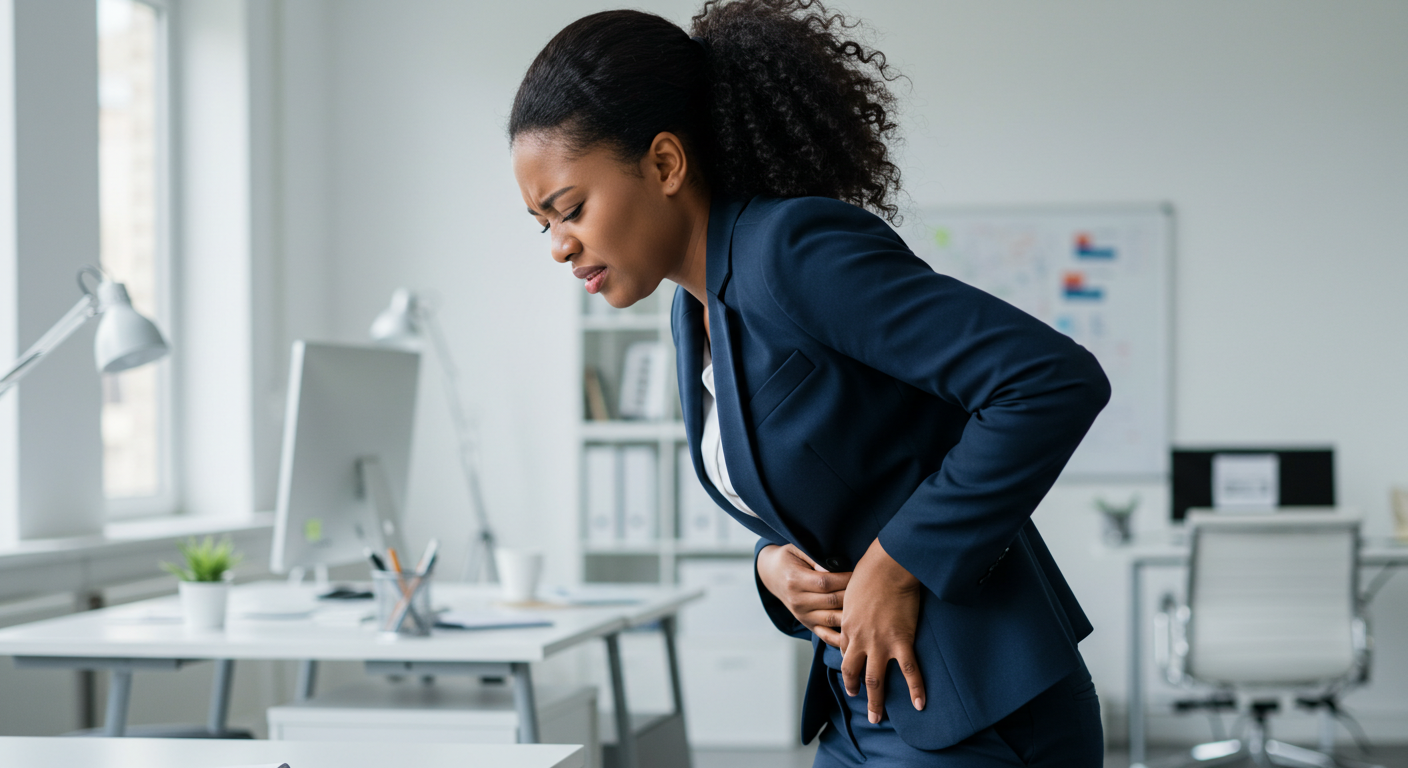
...
Ah, the dreaded menstrual pain. For many, it's a monthly uninvited guest, often announcing its arrival with cramps, aches, and discomfort that can put a damper on our entire week. But what if we told you there are natural ways to whisper sweet nothings to those potential pains even before your period's official due date? Yes, it's possible!
This guide is your cheerful companion on the journey to proactive period pain management. We’ll explore actionable strategies that can help calm your body and mind, making your menstrual cycle a little less about "ouch" and a lot more about "oh, I got this!"
The Uninvited Guest: Understanding Pre-Period Pain 🩸
Before we dive into solutions, let's briefly touch on what we're tackling. Menstrual pain, medically known as dysmenorrhea, usually refers to the cramping pain experienced in the lower abdomen just before or during a period. Sometimes, however, this discomfort, bloating, and general unease can start a few days to a week before your period is due – a sneak peek of the main event.
This pain often stems from prostaglandins, hormone-like substances that cause the uterus to contract. Higher levels can mean stronger, more painful contractions. Factors like stress, diet, and lifestyle can also play a role in how intensely these sensations are felt.
Proactive Power: Natural Solutions to Ease the Way ✨
Getting ahead of menstrual pain involves a holistic approach. Here are 5-7 proven strategies you can start incorporating into your routine even before your period is on the horizon:
1. The Hydration Hero: Water, Water Everywhere! 💧
How it helps: Staying well-hydrated is crucial. Dehydration can exacerbate cramping and bloating. Water helps reduce water retention (counterintuitive, right?) and aids in circulation, which can ease uterine contractions.
- Specifics: Aim for at least 8 glasses (about 2-3 liters) of water daily. Start increasing your intake a week or so before your expected period.
- Global Tip: Carry a reusable water bottle as a visual reminder.
- West African Contextual Tip: Fresh coconut water (omi agbon in Yoruba) is an excellent natural electrolyte source and a refreshing alternative. However, plain water is still king!
2. The Anti-Inflammatory Feast: Diet is Your Friend 🥗
How it helps: Certain foods can reduce inflammation in your body, which in turn can lessen the intensity of uterine contractions. Think of it as telling your body, "Chill out!"
- Specifics:
- Increase Omega-3s: Fatty fish (salmon, mackerel), flaxseeds, chia seeds, walnuts.
- Load Up on Greens: Spinach, kale, and other leafy greens are packed with magnesium, which helps relax muscles.
- Spice it Up (Wisely!): Turmeric and ginger are powerful anti-inflammatory spices.
- Reduce Inflammatory Foods: Cut back on processed foods, excessive sugar, red meat, and dairy a week or two before your period.
- West African Contextual Tip: Incorporate local anti-inflammatory powerhouses like ginger (atarodo), turmeric (ata ile pupa), and leafy vegetables such as fluted pumpkin leaves (ugwu) or bitter leaf (ewuro) into your soups and stews.
3. The Warm Embrace: Heat Therapy 🔥
How it helps: Heat relaxes the muscles of your uterus, increasing blood flow and easing cramping. It’s like a warm hug for your belly.
- Specifics: Apply a hot water bottle or a heating pad to your lower abdomen for 15-20 minutes at a time, several times a day, starting a few days before your period. A warm bath can also work wonders.
- Global Tip: Consider reusable heat packs or even a warm towel.
- West African Contextual Tip: Some traditional practices involve applying warm compresses with herbal infusions, or simply using a warm cloth or bottle.
4. Movement Magic: Gentle Exercise 🤸♀️
How it helps: While intense workouts might be the last thing on your mind, gentle exercise can boost endorphins (natural painkillers) and improve blood circulation, reducing pre-period discomfort.
- Specifics: Think walking, yoga, light stretching, or swimming. Aim for 30 minutes, most days of the week, especially in the week leading up to your period.
- Global Tip: Even a short walk around the block can make a difference.
- West African Contextual Tip: Dancing to your favourite Afrobeats or highlife tunes is a fun, cultural way to get your body moving and release tension!
5. Herbal Allies: Nature's Pharmacy 🌿
How it helps: Many herbs have antispasmodic and anti-inflammatory properties that can soothe menstrual pain.
- Specifics:
- Ginger Tea: Brew fresh ginger slices in hot water. It's a potent anti-inflammatory.
- Chamomile Tea: Known for its calming and muscle-relaxing effects.
- Raspberry Leaf Tea: Often called "the women's herb," it can help tone uterine muscles.
- Fennel Seeds: Chew on a few or make a tea; they have antispasmodic properties.
- West African Contextual Tip: Explore local herbal teas (tisanes) that have traditionally been used for women's wellness. Always source from reputable suppliers or consult with local herbalists familiar with the plants and their properties. Examples include certain varieties of "Moringa" (though use with caution and knowledge) or specific preparations of local plants for easing discomfort.
Prevention is Better Than Cure: Long-Term Strategies 🛡️
Beyond immediate relief, adopting these lifestyle modifications can help prevent severe menstrual pain from becoming a monthly torment:
1. Stress Less, Live More: Stress Management 🧘♀️
How it helps: Stress can wreak havoc on your hormones, including those that influence your menstrual cycle. High stress levels can intensify pain perception.
- Specifics: Incorporate daily stress-reduction techniques like meditation, deep breathing exercises, spending time in nature, or engaging in hobbies you love.
- Global Tip: Apps like Calm or Headspace can guide you through mindfulness practices.
2. Sleep Soundly: Prioritize Rest 😴
How it helps: Adequate sleep is essential for hormonal balance and overall body repair. Sleep deprivation can heighten sensitivity to pain.
- Specifics: Aim for 7-9 hours of quality sleep per night. Establish a regular sleep schedule, even on weekends.
- Global Tip: Create a relaxing bedtime routine – perhaps a warm bath or a cup of herbal tea.
3. Magnesium & B Vitamins: Essential Nutrients 💊
How it helps: Magnesium is a natural muscle relaxant, while B vitamins (especially B6) play a role in hormone regulation and reducing fluid retention.
- Specifics: Incorporate magnesium-rich foods (dark chocolate, avocados, nuts, seeds, leafy greens) and B-vitamin-rich foods (whole grains, eggs, legumes). Consider a supplement if your dietary intake is insufficient, but always consult a professional first.
- West African Contextual Tip: Many traditional West African diets are rich in plant-based magnesium sources. Ensure a varied diet with plenty of local greens and legumes.
When to Call for Backup: Crucial Cautions & Red Flags 🚨
While natural remedies are wonderful, they are not a substitute for professional medical advice. It's crucial to know when to seek help:
- Severe Pain: If your pain is debilitating, constant, or interferes significantly with your daily life, especially if it's a new development or worsening over time.
- Unusual Symptoms: If you experience fever, chills, unusual discharge, or pain during intercourse alongside your period pain.
- No Improvement: If natural remedies offer no relief or your symptoms persist despite consistent efforts.
- Excessive Panic: While staying hydrated is good, don't engage in "excessive panicked intakes of fluids" if you're experiencing severe pain that feels out of the ordinary. This could potentially lead to electrolyte imbalances in extreme cases if not medically supervised. Your body needs consistent, balanced hydration, not a sudden flood in a panic. The underlying reasoning is that your kidneys can only process so much fluid at once, and forcing excessive amounts can dilute essential salts in your blood.
- New Onset of Severe Pain: If you've always had mild periods and suddenly experience severe, excruciating pain, it warrants immediate medical attention.
These could be signs of underlying conditions such as endometriosis, fibroids, adenomyosis, or pelvic inflammatory disease, which require medical diagnosis and treatment.
Embrace these proactive strategies and give your body the loving care it deserves. Here's to smoother, less painful periods!

What are YOUR go-to natural remedies for pre-period pain?
We'd love to hear your experiences and tips in the comments below! Your insights could help someone else.